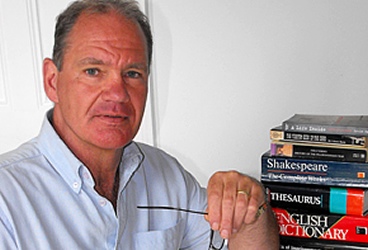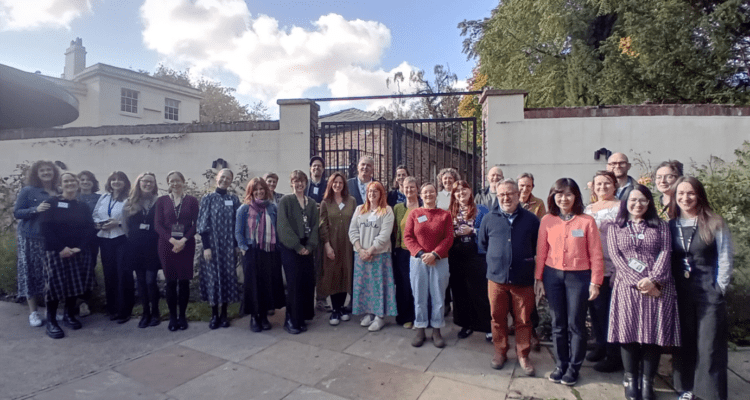Redeemable: Erwin James on reading and finding redemption
Ahead of his appearance at the London Penny Readings, we spoke to Erwin James about his new book Redeemable and his relationship with literature.

Erwin James
Since beginning writing for The Guardian in 1998 as a serving prisoner, Erwin James has become one of the most authoritative voices on prison issues in the UK. His regular column reflecting on his own experiences of 'A Life Inside' were the first and remain the only of their kind in the history of British journalism, and gave way to two books - A Life Inside: A Prisoner's Notebook and The Home Stretch: From Prison to Parole, as well as a career as a freelance writer.
Crediting the interest he developed in reading and education whilst in prison with changing his life he became a patron of The Reader in 2012. He has spoken about his personal experiences at a number of Reader events, including our National Conference in 2012, and has written for The Reader magazine about how reading opened up a world otherwise inaccessible to him during his time in prison - as well as giving him a goal he might not ever have otherwise considered achieving:
"The early weeks and months of my imprisonment provided no clues that a life spent in prison could ever remedy my deep-rooted inadequacies. But at least I could read." - Erwin James, writing in The Reader Issue 54
Erwin's third book, Redeemable: A Memoir of Darkness and Hope, details how he came to terms with the enormity of his crimes, the painful truth of his past as well as finding a way into the future. Recently, we interviewed Erwin about the book - his most personal to-date - and the ways in which reading has played a key part in his redemption.
Erwin, this is your third book and literature has obviously played a key part in your personal journey to writing Redeemable – what made you want to write your very first book to begin with?
As I developed as a writer in prison I began to wonder and fantasise about whether I would ever write a book. My very first book was a story about a man I met in prison who I believed had been wrongly convicted. I spent months going through his paperwork, noting the errors and problems in the prosecution case against him. I discovered that his wife has conspired with his lawyer to have him sent down for life - the lawyer then moved into his house and basically took over his life - it was a horrendous case, and totally true. I wrote the book to try and get him out - managed to get an agent to submit the book to publishers, but no one would touch it due to legal issues - and I was just a convict with no credibility outside prison so the book never got published. But writing that book was a terrific apprenticeship for what was to come.
It’s been over ten years since A Life Inside: A Prisoner’s Notebook which covers your time spent in prison. What made you feel ready to go beyond that and write a memoir?
I'd been toying with the memoir for most of that time - it's just so incredible that I managed to get to where I got to after 20 years in prison - yet 22 years early I'd been a drunken rough sleeper and had actually slept rough behind the old Guardian building in Farringdon Road. From such a failed life to emerge from prison with skills, abilities and hope - I thought I needed to try and explain that whole process. It was just so extraordinary.
Redeemable looks at key relationships in your life pre- and post-prison – was this more difficult to write about?
It was hard to reveal the worst about myself for the world to scrutinise and make judgement. I didn't really want to upset anyone or cause any more distress than I already have in my life. But I just felt this was a story that needed to be told. The relationship between me and Joan Branton, the psychologist who helped me, was the real key to how I managed to learn to live again. I had to go over a lot of old paperwork in order to document our interactions accurately - that was painful - but helpful too, not just for the book, but for me to be reminded of that part of the journey.
Your journey with books changed throughout your time spent in prison, can you tell us more about that and what it meant for you?
I used books in the beginning just to occupy my mind and sort of escape from my immediate circumstance. Books are a great escape from any difficult situation in life. But then, again through Joan Branton really, I learned that books could help you to think clearly, reflect and to figure out how you want to live.
If there was one book or poem you could encourage people to read who might feel stuck and alone, perhaps even looking for their own redemption – what would it be?
I always refer to Prisoners of Honour by David Levering Lewis, a book about the Dreyfus Affair, when anyone asks me that. But I'd also recommend The Grass Arena by John Healy - the story of his failed life through alcoholism, violence and then his redemption through chess. I read John's book in prison, never imagining that I might meet him one day - but I love the fact that I did meet him and over the past ten years we have become great friends.
You’re a patron of The Reader - can you tell people why you’re a supporter of our work?
Reading can change the way you think about life - it did that for me - in the most dire of circumstances; books helped me to figure out my place in the world. It's no exaggeration to say I think books probably helped me to stay alive in prison. I did experience a little shared reading in jail, with a teacher who was mad about Shakespeare and who formed a little Shakespeare reading group. I loved reading passages together in that group and then discussing it in the group - that really brought the plays and the sonnets to life. I met the poet Ken Smith in prison too - a librarian brought him in and he did a shared reading group with about a dozen of us. He was brilliant, such a generous gent. The fact that The Reader promotes and facilitates shared reading on a real scale is just wonderful - and I feel really honoured that I'm a patron of a body that brings so much hope to people in so many different walks of life - including prisons and special hospitals where hope is often all but non-existent.
Redeemable: A Memoir of Darkness and Hope (Bloomsbury) is available to buy now. More from Erwin can be read on his blog.
We're delighted to have Erwin joining us as a guest reader for this year's London Penny Readings later this month at Southwark Playhouse, along with actress Claire Skinner and a packed bill of reading, music and entertainment.
Share
Related Articles

Celebrating the first ever International Shared Reading Conference
‘It has been a wonderful day - great meeting you all! Loved the Shared reading and getting new knowledge. Inspiring…

November’s Stories and Poems
This month, we are turning our focus to a major part of The Reader’s in Criminal Justice settings. For 15…

November’s Choice From The Reader Bookshelf
The Reader Bookshelf is a carefully curated collection of literature for adults and children, exploring a different theme each year, this…


